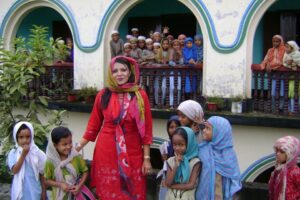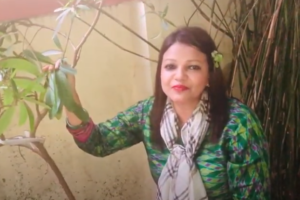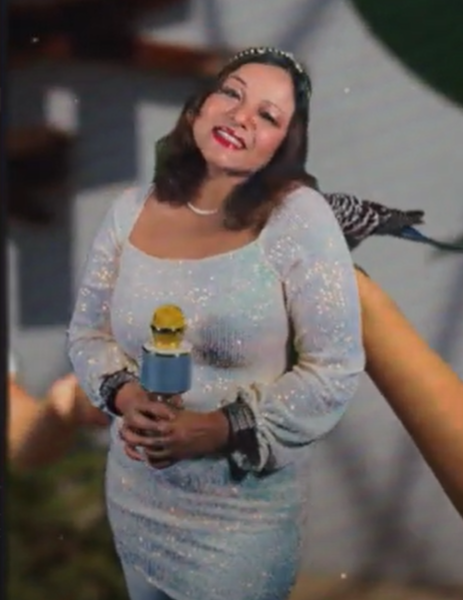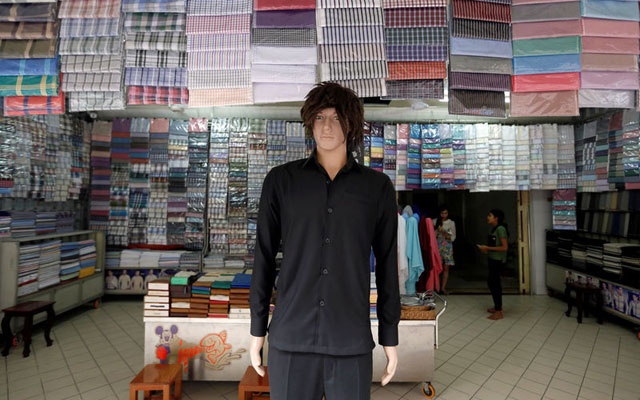Conservative groups in Pakistan are often heard to invoke a famous saying: the proper place of a woman is in her “chadar aur char diwari” – meaning veiled and within the four walls of her home.
But this weekend, in the face of violent threats and legal petitions, women across Pakistan are preparing to demand their rights in direct defiance of that belief.
Since 2018, Aurat March – Urdu for Women’s March – has been held in many cities across Pakistan to coincide with International Women’s Day on 8 March. It is no small feat in a conservative Muslim country where many women often don’t feel safe in public places because of the harassment they often endure.
Those who took part last year faced intense backlash, especially online. Some said they had received death and rape threats afterwards.
And this year, voices on both sides of the debate have grown louder in the lead-up.
While religious and right-wing groups have said the march goes against Islam, even moderate factions have taken issue with what the marchers themselves acknowledge is a provocative approach.
“There’s a deep conflict in the society that we live in, about the right of women to ask for their rights; to be mobile, to be out in the streets,” says a 38-year-old organiser in Karachi, who did not want to be identified.
The idea for Aurat March began when a few women decided to mobilise their networks and gather in a park in the port city of Karachi on International Women’s Day to ask for an end to violence and harassment.
It has since evolved into a wider movement, including transgender people, demanding better laws to protect women and enforcement of existing laws, as well as raising awareness and changing attitudes.
The march took inspiration from similar events in the US, but has been further fuelled by incidents at home. The “honour killing” of social media star Qandeel Baloch by her own brother and other incidents have shone a light on violence against women in recent years.
“The need for younger feminists to have a voice was already there,” says the organiser, who was part of that original group of women.
“We are challenging the status quo. We’re challenging the regressive elements in our society.”
‘Snatch your rights’
This year the key demand is economic justice for women, as highlighted in the manifesto.
But it was the slogans and signs held up in 2019 which drew wider attention to the movement. Participants faced criticism and abuse in the mainstream media, alongside intense trolling online.
It was the rallying cry “mera jism, meri marzi”, which translates to my body, my choice, in particular which touched a nerve last year and continues to cause controversy ahead of this year’s march.
Aurat March proponents have argued it is about a woman’s control over her own body, but the phrase was seen by critics as obscene, having a sexual connotation and going against the highly prized expectation of modesty in a woman.
It’s also contributed to the voices saying the movement is too Western in its ideals.
Noor (not her real name) created a poster with these words for last year’s march. She came up with the slogan because she wanted to highlight the right of women to have agency, to choose what she wants to wear and do with her own body, without fear of harassment or rape.
She says the negative reaction has scared her so much that she now finds it difficult to speak with her real name.
Noor was speaking to BBC Urdu.
Those involved acknowledge the slogans and signs are provocative, but they argue that’s what is needed when you are trying to change social norms.
“One way [to address issues] is to continue slowly working, and hope to achieve a result maybe a few decades later. The other approach is to just snatch your rights because it has been too long, it has been too hard and it has been too traumatic,” says a 28-year-old volunteer, who identifies as gender fluid.
There have been attempts by the group to explain the ideas behind the movement through their social media channels and community outreach .
But that doesn’t seem to have prevented the deep divisions and tense exchanges ahead of this year’s event. If anything they’ve grown more vitriolic.
Posters and murals put up by organisers have been vandalised. Social media posts asking for volunteers have unleashed a barrage of misogynistic abuse.
“We are probably going faster than the society can digest… but we are helping them unlearn the toxicity that was taught to them by the society, culture and religion and we are trying to make them learn a new de-gendered system,” the volunteer acknowledges.
The controversy has even reached the court in Lahore, where a petition was filed last month to stop the march from going ahead, arguing that its aim was to “spread anarchy, vulgarity, blasphemy and hatred” of Islam.
The court ruled it should proceed – but said organisers needed to ensure people participating adhere to “decency and moral values”.
And as the march gets closer, the battle appears to be intensifying. The debate reached a fever pitch this week when a playwright known for his misogynistic views, verbally abused a female rights activist during a panel on Aurat March on live television.
While there was condemnation of his outburst, the same people cautioned organisers on their messaging.
Mahira Khan, one of Pakistan’s most famous actresses, said on Twitter that she supported the march but warned against using provocative placards.
But international human rights groups have come out to support the march, with Amnesty International condemning “the horrific threats of violence, intimidation and harassment of the marchers”.
“The fact that women are unable to demand their human rights without being put in very real danger underscores just how important the Aurat March is.”
The volunteer says they are fearful of acid attacks, bomb threats, stalkers and even doxxing – the publication of someone’s personal details online.
“We are scared. But if we are not scared, if we don’t have fear, how do we expect the change to come?”
Come Sunday, even the fear won’t keep them confined to the veil and four walls anymore.
Source: BBC






















